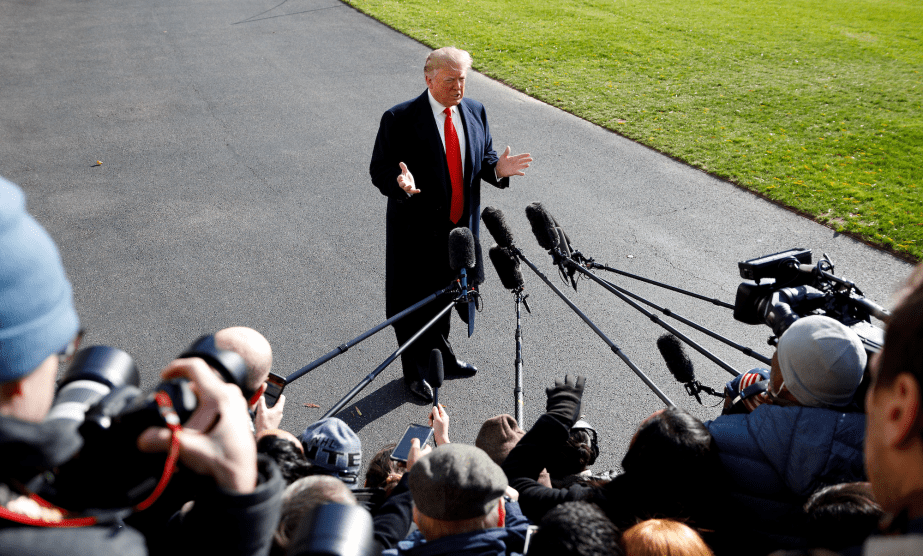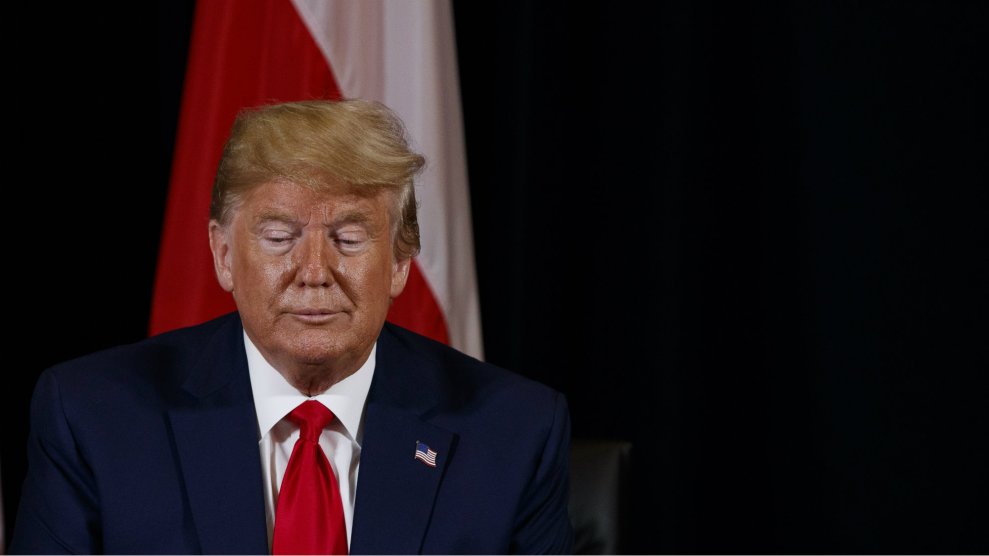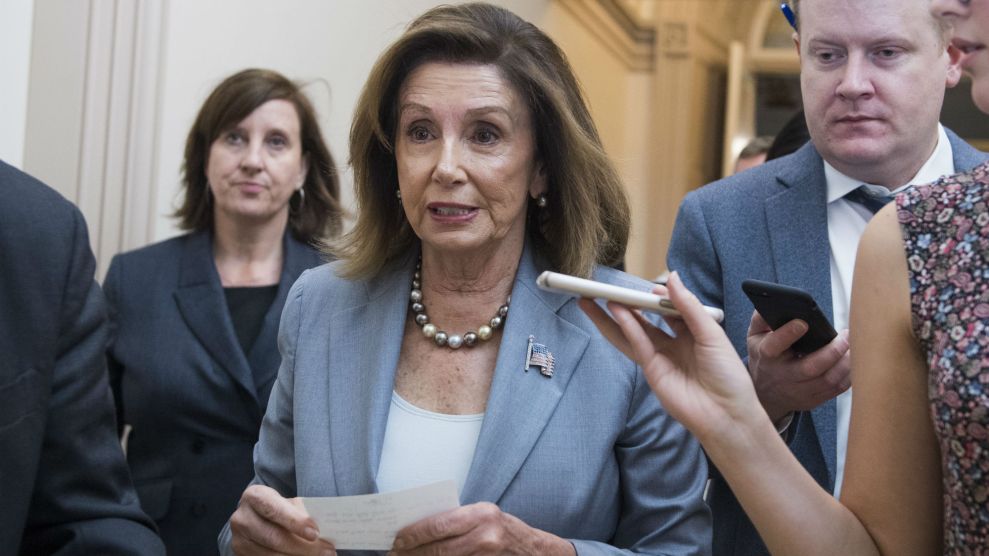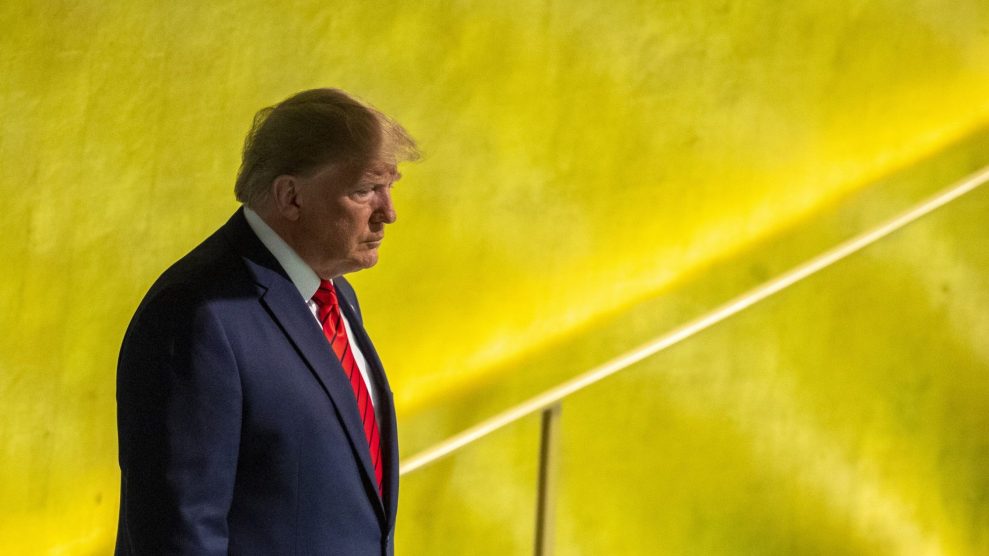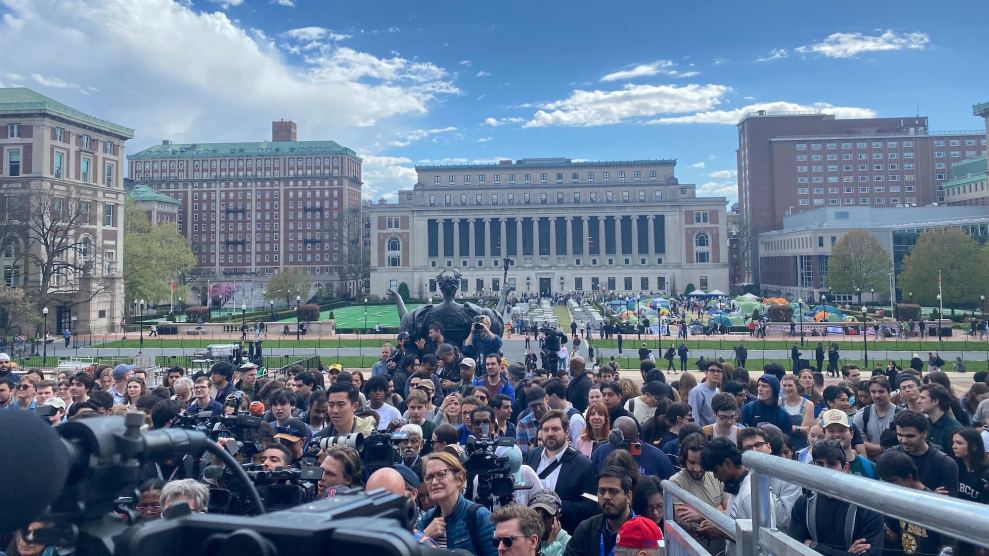
Jim Loscalzo/Zuma
In a special, breaking-news edition of the Mother Jones podcast taped on Tuesday, our Washington, DC, bureau chief David Corn walks host Jamilah King through the series of events that led to House Speaker Nancy Pelosi’s historic decision Tuesday to launch a formal impeachment inquiry into President Donald Trump. The move, Corn says, represents “a tectonic shift on the part of Nancy Pelosi and the House leadership.” Also on the podcast, national security reporter Dan Friedman breaks down what we know and what we don’t know about the whistleblower complaint that set the impeachment discussions in motion. Listen to the podcast below, or read a lightly edited transcript—not a memo—of the show.
Jamilah King: It’s happening: Impeachment hearings against the president of the United States.
BREAKING: Speaker Nancy Pelosi: "Today, I'm announcing the House of Representatives is moving forward with an official impeachment inquiry."
"The president must be held accountable; no one is above the law." https://t.co/WZnIWjR7tP pic.twitter.com/fAM81LJUju
— ABC News (@ABC) September 24, 2019
How a secret whistleblower complaint against Donald Trump rapidly transformed from a trickle of news into a full blown torrent that finally broke the dam. House Speaker Nancy Pelosi’s historic announcement. Trump’s presidency heading into one hell of a storm. Why now and what’s next? Everything you need to know.
The spark that set this fire ablaze was an intelligence community whistleblower complaint that Trump pressured the president of Ukraine to open a corruption investigation into former Vice President Joe Biden and his son, Hunter. Congress still hasn’t seen that complaint. And Trump’s stonewalling appears to have pushed Pelosi to act. You’ll hear about the origins of the whistleblower complaint soon. But let’s get straight to this announcement.
Mother Jones’ Washington, DC, bureau chief David Corn is joining me right now from MSNBC, where he’s about to go live. David, I mean, where to start? What a day.
David Corn: What a day. It’s not a surprise for us to reach this point. It was not very pretty. How it got reached, a lot of infighting in the Democratic Party. A lot of concern among Democratic activists and commentators, among people concerned with the republic about what was the proper way to go in terms of impeachment, in terms of dealing with Donald Trump, and not just one, two, three, four or five scandals, but a multitude of scandals, beginning with the original sin of how he betrayed the country by basically encouraging the Russian attack and providing cover for the Russian attack on the election in 2016.
David, it sounds odd to say, given all that Trump has done almost dare Congress to impeach. But in this instance, this all seemed to happen pretty quickly?
Well, this is a pretty classic case of a tipping point. For a long time, from the beginning of the presidency, there were well-founded arguments for impeaching Donald Trump. There were well-founded political arguments for focusing on oversight and telling the story of his corruption rather than rushing ahead with impeachment, which would be kind of like going to DEFCON 1: It would make it harder to tell the story of Donald Trump’s corruptions and scandals and controversies if you’re fighting over the big issue of impeachment.
So, that’s been—there’s been a lot of back and forth for months, for over a year now. Yet we finally had the straw that broke the camel’s back, though I hate to use a cliché here: the whole Trump-Russia-Ukrainian scandal, which, according to what we know as of now, seems to have been a case of great brazen abuse of power, in which he leaned on the president of another country to produce opposition research that would be helpful to him in his campaign for re-election. It may or may not be a crime depending what happened. But it is certainly immoral and an abuse of power. And it seems as if it’s a pretty clear-cut case, and they are covering up by trying to keep an intelligence community report on this from Congress even though under the law it has to be produced to Congress. And at this stage of the game, when the Trump administration is stonewalling on so many other fronts and so many other investigations, including getting his tax returns, including emoluments, including obstruction of justice related to the Trump-Russia investigation, I think finally Nancy Pelosi saw that there’s no other remedy here; you know, they can take him to court only so many times, and try to force him to abide by the norms of U.S. government, and not get anything out of that before they have to go for the extreme remedy of an impeachment inquiry.
Now we have to remember, it’s an impeachment inquiry. It’s not a vote yet to impeach him. And then when it comes to that key issue of a vote, there are 177 Democrats now who basically voiced their support for impeachment. [Editor’s note: It’s up to 208 as of 2 p.m. Wednesday.] How many votes do you need to pass this? 218. So Nancy Pelosi right now is 41 votes short, at least in terms of public declarations. Now, what could be worse for the Democrats than to bring forward an impeachment vote and have it not succeed because you don’t have enough Democrats? There are 31 Democrats who come from districts, congressional districts, where Trump won the vote last time, and a lot of these members have been saying to Nancy Pelosi that they don’t want to be forced to vote on impeachment. That is to vote to toss out the guy who most of their constituents elected president. But there’s been some shifting in recent days there. So she still has a bit of a political task ahead of her if the impeachment inquiry leads to an impeachment vote—that is, a vote on articles of impeachment to send over to the Senate. She still needs 41 more Democrats than she currently has.
But you’re saying, there’s real momentum here to close the deal no matter what happens now?
There’s momentum to move ahead with what they are officially calling an impeachment inquiry. Now, how different is this going to be than what they were doing to begin with? Well, they already were investigating Trump on obstruction of justice. It was clear the Ukraine issue was going to be part of a congressional investigation. They’re investigating his tax returns, investigating the emoluments—that is basically institutionalized bribery or potential bribery of foreign governments and individuals giving money directly to Trump through his business. So all these things are being investigated over the course of six different committees. So these investigations will continue, now under the umbrella of an impeachment inquiry. And so ultimately I guess the process—we don’t have all the details yet—will be that these committees will come to some conclusions on the basis of their investigations and funnel those conclusions in terms of whether they have found what they believe are impeachable offenses to the House Judiciary Committee, which would be the committee in charge in most cases of moving forward with articles of impeachment. So there’s not a lot of change in terms of what is being done, but the name of all this changes, and that is indeed a tectonic shift on the part of Nancy Pelosi and the House leadership.
Pelosi said earlier on Tuesday that it doesn’t matter if Trump offered Ukraine anything in exchange for investigating former Vice President Joe Biden. I presume that may be Trump’s main defense here. Is that right?
They’ve already said that there was no quid pro quo explicitly offered in this phone call, which is why Trump is talking about releasing the transcript of the phone call. But we do know that he pressed the Ukrainians to deal with Rudy Giuliani to come up with dirt on Joe Biden. And it does seem as if Trump in some ways made a suggestion that that should be done in his phone call with the Ukrainian president. [Editor’s note: He did indeed, as notes of the phone call reveal.] We may learn more on this come tomorrow. But nevertheless, even if the president did not go through a direct quid pro quo, if he held up aid to Ukraine, which he did, Ukrainians know the aid is being held up. And then if he calls them and says, “I want you to produce dirt on a political opponent,” I mean, this is not too hard for them to see what’s going on!
And just asking a foreign government to give you opposition dirt on your opponent while you are holding up aid to them—this is not like it has to be spelled out! Michael Cohen told us when he testified that Trump doesn’t always tell you what to do, but he tells you what to do. It’s just not explicitly. Like, you know you have a good story to tell. Go tell that story. Well, Michael Cohen knew what that meant when Trump told him these things. So it may not explicitly say, “Listen, I will do this if you do that,” just in the same way that Trump did not explicitly collude with Russian hackers to break into the DNC servers. But when he’s saying publicly to Russia, “I hope you hacked Hillary Clinton,” and when his people are meeting with Russian emissaries secretly to get dirt from Moscow to help his campaign, all these things are sending a message to the other side: “I want your help. And we have a conspiracy here. We’re just not going to talk about it explicitly.”
Trump has just tweeted, David. Here’s what he says that backs up exactly what you are saying. “They never even saw the transcript of the call. A total witch hunt. Presidential harassment.” This is what Trump is saying. What do you make that?
Well, you know, nothing he says is true. Nothing he says is true. He called the Russian inquiry a total witch hunt and the Mueller report talked about how he lied about the Russian attack to cover up and start to benefit from it. So basically— Mueller was too polite to say this—Trump committed an act of betrayal against the United States while running for president. So this is the playbook. It unfortunately, in a lot of ways, worked on the Trump-Russia scandal. He made it seem messy. He got his people and Fox News and all the conservative commentary and Republicans to buy into this witch hunt, hoax, harassment BS. So he’s going to try that again. We don’t know what the transcript says, but we do know that there are other people to talk to. We do know that Chris Murphy, a senator from Connecticut, a Democratic senator, says that he spoke to the president of Ukraine, who said that he felt pressured by Trump.
Trump kept trying to say, “If there’s no evidence of direct collusion in the Trump-Russia scandal, there’s nothing wrong!” He’s going to try to do that here. And this time, I hope the media and Democrats don’t fall into that trap.
So are Republicans just going to keep following this Trump script or do you see any reason that they will finally break off?
I don’t know. Mitch McConnell, shortly before Nancy Pelosi announced the impeachment inquiry, basically agreed to a Democratic initiative in the Senate to get a copy of the intelligence community report on this from the inspector general. I don’t know if this is Mitch McConnell being nervous or if he has something up his sleeve. They’ve announced a bipartisan investigation on the Senate side into the Trump-Ukraine controversy. Now, there has been a bipartisan intelligence committee investigation of the Trump-Russia scandal on the Senate and it’s produced nothing. I mean it basically was a stall job. So it’s hard to tell at this moment in time if there is a real shift or if McConnell and the Republicans are being a little bit crafty in some way here. We don’t know, but if I were in the Trump White House, I would look at all this and say, “You know what? There’s a possibility that Republicans may not stick with us on this.” Now am I Jim Carrey in Dumb and Dumber saying, “There’s a chance, there’s a chance!” because it’s a one-in-a-million chance? I don’t know, but maybe, it’s a three-, four-, or five-in-a-million chance.
Finally, David, the common concern I hear is that this will suck up oxygen from the 2020 campaign. Where do you stand on that?
You can judge candidates by how they deal with what’s happening in the real world. Now, there’s only a few months left—weeks almost—in this session of Congress before they break; they come back probably at the very start of the primaries. So there’ll be plenty of time for the Democrats still to fight amongst themselves. And they’re doing the hard work on the ground in the key states. So I don’t think this really will get in the way.
Joining me now is Dan Friedman, who covers foreign influence and national security for Mother Jones in our D.C. bureau. Dan, let’s go back to the beginning of this whole thing. What do we know about the whistleblower complaint and how it came to be?
Dan Friedman: So I believe it was the Friday before last, September 13th, which happened to be Constitution Day. Adam Schiff, the chairman of the House Intelligence Committee, announced that the DNI, the director of National Intelligence, the acting director of National Intelligence, was refusing to turn over to the Intelligence Committee a whistleblower complaint—despite, Schiff said, a very clear statute that said that he had to turn it over to the Intelligence Committee. And through a series of reports it has emerged that that whistleblower complaint relates, at least in part, to Trump’s dealings with Ukraine, and the new president of Ukraine, Zelensky. And specifically, to pressuring Zelensky to help Trump’s personal lawyer, Rudy Giuliani, get information on Joe Biden and whether he nefariously tried to get a prosecutor there fired, because it had something allegedly to do with Biden’s son Hunter Biden.
We know that Rudy Giuliani has had a role in this whole bizarre affair including some spectacularly weird TV appearances.
.@ChrisCuomo: "So you did ask Ukraine to look into Joe Biden?"@RudyGiuliani: "Of course I did"
President Trump's attorney says he had spoken with a Ukrainian official about Joe Biden's possible role in that government's dismissal of a prosecutor who investigated Biden's son. pic.twitter.com/FTaLGBV1zO
— Cuomo Prime Time (@CuomoPrimeTime) September 20, 2019
How was the president’s lawyer involved?
Ever since Giuliani left the mayor’s office in New York, he has made a lot of money without a lot of public disclosure from various enterprises giving speeches, as well as providing security consulting and other kinds of legal advice to clients around the world, and one of the places that he’s done business is Ukraine. Giuliani had had some consulting business in Ukraine in 2017 and in 2018, shortly after becoming Trump’s lawyer. He signed on with these two Soviet-born Americans who now live in South Florida who are interested in publicizing information on Biden’s role in getting this prosecutor in Ukraine fired. And he had a bunch of meetings in Ukraine that he has never really shared much information on.
But a couple of things happened possibly as a result of those meetings: One thing is the Ukrainian prosecutors ceased cooperating with Special Counsel Robert Mueller on turning over information about Paul Manafort to Mueller. The other thing that happened is that they—the same prosecutor’s office—announced that they were looking into whether in 2016, when information about Manafort’s secret payments that he was receiving from the Ukrainian government years ago came out in middle of the election, whether that had been improperly released as a way to influence the U.S. election. Both of these things were things that Trump wanted and Giuliani as his lawyer wanted. And Giuliani has said that he wasn’t particularly involved in these pieces of information coming out. But I think there’s reason to wonder if he was starting to try to get the Ukrainian government to understand that they would like—that it would be helpful for their relationship with Trump and the United States if they took these steps.
Once that previous government lost in the election back in the spring, Giuliani seemed to be seeking to convince the new government led by Zelensky to hand over information about Hunter Biden’s involvement with this company and whether Joe Biden had sought to help protect that company from prosecution. There is no evidence at all that any of that happened.
How much stock should listeners put into the kind of things Trump and Giuliani are trying to level at Biden his son right now?
No stock, I would say just about. One reason we shouldn’t put stock in anything that Trump and Giuliani say is because Trump has said repeatedly that Biden wanted this prosecutor fired because the prosecutor was investigating this company on which Biden’s son, Hunter Biden, was on the board. It’s not true that the prosecutor was investigating that company. That investigation was not ongoing at the time. So the sort of foundation of what they’re trying to smear Biden with is untrue. That that is very good reason to discount what they’re saying.
Another big part of this story: Trump reportedly halted a funding package to Ukraine ahead of talking to the president of Ukraine. But he denies there was any quid pro quo here. What’s that aid package?
There’s actually two different aid packages that total, I think, somewhere just short of 400 million dollars. But it’s for military aid and other aid to the Ukrainians so that they can resist or try to resist aggression from Russia, their neighbor to the east. That package was held up just days before Trump made these requests to Zelensky, the Ukrainian president. And really, whether or not the Ukrainians got an explicit request from Trump that if they gave up this information, if they took steps to investigate Biden they would get their money, there’s kind of an inherent coercive position that Trump has, a power that he wields when he has these conversations, that it doesn’t make much difference if he posited an explicit quid pro quo. I think it was pretty clear to the Ukrainians that he had the power to do this kind of thing. So when he was asking for help digging up dirt on Biden, they had great reason to understand that Trump could make life more difficult for them or easier depending on how they responded.
Trump has promised a transcript of the phone call between him and the Ukrainian president in which allegedly Trump pushed Ukraine to investigate Biden. But seeing that would not be the whole picture of what happened, right?
Yeah. The whistleblower complaint deals with more than just this one phone call is, at least as far as we’ve seen in the reporting. It’s a series of communications that he had. And again, Trump wants to say that there was no quid pro quo in this phone call, so therefore it’s all okay. Perfect phone call, he says. But again, the president of the United States has such power over this aid package, it doesn’t matter really if Trump said explicitly in this conversation, “You’re only getting your money if you give me this help.” The Ukrainians knew that that kind of deal was—that Trump could easily make that kind of thing happen or not happen, so they had reason to want to do what he said. So both for the reason that there’s a lot more communications than just this phone call, and because the explicit quid pro quo doesn’t matter, this is kind of a too-little-too-late offer by Trump.
Dan, what are you watching out for next?
I think next we’re gonna find out really soon what’s in this whistleblower complaint. The transcript of the call presumably is gonna be out soon. We shouldn’t necessarily believe Trump, but one way or another I think the details are gonna come out. And the whistleblower complaint: Already, the Senate just voted this evening in a non-binding resolution calling for the White House essentially to turn over the whistleblower complaint to the Senate Intelligence Committee. And given all the reporting that’s happened and how quickly things are happening, I think the whistleblower complaint or many of the details in the whistleblower complaint that we don’t know yet, as well as the transcript of this particular phone call between Trump and Zelensky, are gonna come out ,and we’re gonna know a lot more about the larger context in which this phone call came. And it sure seems like that’s going to happen sooner rather than later.

